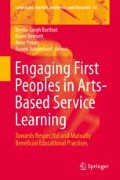Abstract
Since 2009, pre-service teachers from the University of Western Sydney have been visiting Tennant Creek in Central Australia, teaching in the High School and interacting with the community in their projects. This service learning experience, partnering with the Australian Literacy and Numeracy Foundation (ALNF) and the Papulu Aparr-Kari (PAK) Indigenous Language Centre, focuses attention on educational outcomes for Aboriginal students in remote Australia. While the arts-based service learning projects have respected the identity and decision-making of the young musicians, they have been life changing for the pre-service teachers. This chapter demonstrates how service-learning projects have forged a different kind of teacher identity that is based on mutual relationships.
Access this chapter
Tax calculation will be finalised at checkout
Purchases are for personal use only
References
Australian Council for Education Research (ACER). (2008). Indigenous languages programs in Australian schools: A way forward (Report to the Australian Government Department of Education, Science and Training). Canberra, Australia: ACER.
Australian Institute of Aboriginal and Torres Strait Islander Studies (AIATSIS), & Federation of Aboriginal and Torres Strait Islander Languages (FATSIL). (2005). National Indigenous languages survey report 2005. Canberra, Australia: AIATSIS.
Burnard, P., & Power, A. M. (2013). Issues in conceptions of creativity and creativity assessment in music education. In K. Thomas & J. Chan (Eds.), Handbook of research on creativity (pp. 212–229). Cheltenham, UK: Edward Elgar.
Chupp, M. G., & Joseph, M. L. (2010). Getting the most out of service learning: Maximizing student, university and community impact. Journal of Community Practice, 18(2), 190–212.
Clandinin, D. J., & Connelly, F. M. (1996). Teachers’ professional knowledge landscapes: Teacher stories-stories of teachers-school stories-stories of school. Educational Researcher, 25(3), 2–14.
Cohen, A. (2012). Creativity in singing: Universality and sensitive developmental periods? In D. Hargreaves, D. Miell, & R. MacDonald (Eds.), Musical imaginations (pp. 173–192). Oxford, UK: Oxford University Press.
Cohler, B. J., & Galatzer-Levy, R. M. (1992). Psychoanalysis and the classroom: Intent and meaning in learning and teaching. In N. M. Szanjnberg (Ed.), Educating the emotions: Bruno Bettelheim and psychoanalytic development (pp. 41–90). New York: Plenum.
Dostilio, L., Brackman, K., Edwards, K., Harrison, B., Kliewer, B., & Clayton, P. (2012). Reciprocity: Saying what we mean and meaning what we say. Michigan Journal of Community Service Learning, (Fall), 17–32.
Elliott, D. (1995). Music matters: A new philosophy of music education. New York: Oxford University Press.
Hargreaves, A. (2000). Four ages of professionalism and professional learning. Teachers and Teaching: History and Practice, 6(2), 151–182.
Harslett, M. (1998). Teacher perceptions of the characteristics of effective teachers of Aboriginal middle school students. Paper presented at the Australian Association for Research in education conference. Retrieved March 22, 2015, from http://www.aare.edu.au/98pap/har98093.htm
Ibarra, H. (1999). Provisional selves: Experimenting with image and identity in professional adaptation. Administrative Science Quarterly, 44(4), 764–791.
Khisty, L. (1995). Making inequality: Issues of language and meaning in mathematics teaching with Hispanic students. In W. Secada, E. Fennema, & L. Adajian (Eds.), New directions for equity in mathematics education (pp. 279–297). Cambridge, UK: Cambridge University Press.
Krensky, B., & Steffen, S. L. (2008). Arts-based service-learning: A state of the field. Art Education, 61(4), 13–18.
Lawson, J., Ey, V., & Smajlagic, E. (2006). Linking learning between home and school. In the Fair Go Project, School is for me. Pathways to student engagement (pp. 67–73). Sydney, Australia: NSW Department of Education and Training.
Lock, G. (2011). Musical creativity in the mirror of Glaveanu’s five principles of cultural psychology. Culture and Psychology, 17(1), 121–136.
Malin, M. (1998). They listen and they’ve got respect: Culture and pedagogy. In G. Partington (Ed.), Perspectives on Aboriginal and Torres Strait Islander education (pp. 245–273). Tuggerah, Australia: Social Science Press.
Mills, J. (2003). Musical performance: Crux or curse of music education? Psychology of Music, 31(3), 324–339.
Morgan, G. (2007). A city of two tales: Distinction, dispersion and dissociation in Western Sydney. American Sociological Review, 35(3). Retrieved June 18, 2010, from http://www.uws.edu.au/__data/assets/pdf_file/0019/7174/Morgan_Final.pdf
Munns, G. (1998). They just can’t hack that: Aboriginal students, their teachers and responses to schools and classrooms. In G. Partington (Ed.), Perspectives on Aboriginal and Torres Strait Islander education (pp. 171–187). Tuggerah, Australia: Social Science Press.
Nettle, D., & Romaine, S. (2000). Vanishing voices: The extinction of the world’s languages. London: Oxford University Press.
Power, A. M. (2012). Shaping professional teacher identities through service learning: An Australian context. In T. Murphy & J. Tan (Eds.), Service-learning and educating in challenging contexts (pp. 217–234). London: Continuum.
Stronach, I., Corbin, B., McNamara, O., Stark, S., & Warne, T. (2002). Towards an uncertain politics of professionalism: Teacher and nurse identities. Journal of Education Policy, 17(1), 109–138.
Wenger, E. (2000). Communities of practice and social learning systems. Organisation, 7(2), 225–246.
Author information
Authors and Affiliations
Corresponding author
Editor information
Editors and Affiliations
Rights and permissions
Copyright information
© 2016 Springer International Publishing Switzerland
About this chapter
Cite this chapter
Power, A. (2016). Transformations in Arts-Based Service Learning: The Impact of Cultural Immersion on Pre-service Teachers’ Attitudes to Australian Aboriginal Creative Music-Making. In: Bartleet, BL., Bennett, D., Power, A., Sunderland, N. (eds) Engaging First Peoples in Arts-Based Service Learning. Landscapes: the Arts, Aesthetics, and Education, vol 18. Springer, Cham. https://doi.org/10.1007/978-3-319-22153-3_10
Download citation
DOI: https://doi.org/10.1007/978-3-319-22153-3_10
Publisher Name: Springer, Cham
Print ISBN: 978-3-319-22152-6
Online ISBN: 978-3-319-22153-3
eBook Packages: EducationEducation (R0)

